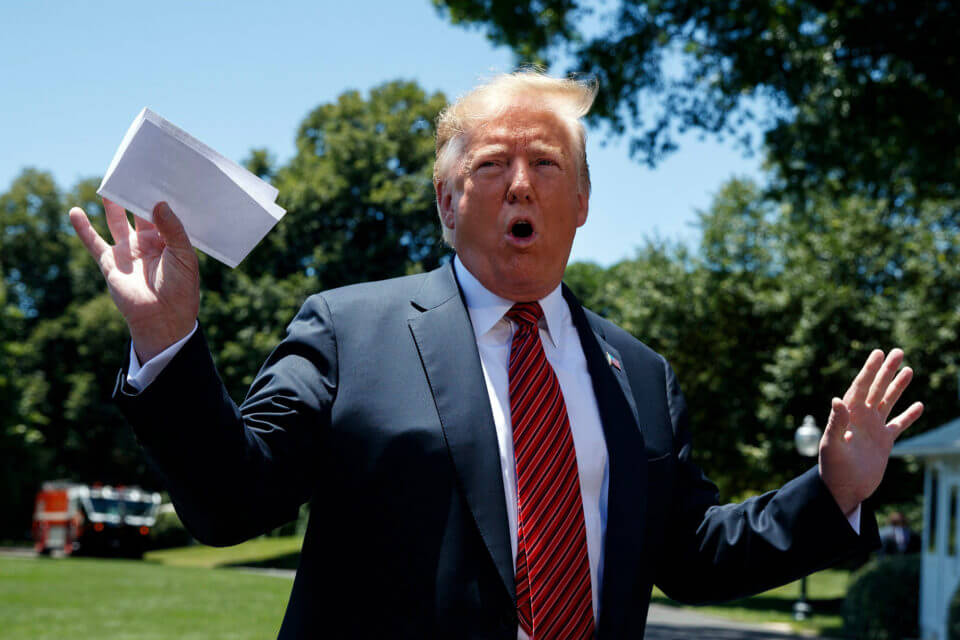
“This may sound as if Mexico were evil and did not want to help others, but this is not the case. If we become a safe third country, we would be biting off more than we can chew by condemning migrants to hellish conditions—mainly due to organized crime and lack of resources—and becoming the U.S. backyard.”
President Trump stood there, in front of dozens of cameras holding a white piece of paper. “That’s the agreement everyone says I don’t have. I’m going to let Mexico do the announcement at the right time…,” he claimed, as he quickly folded the paper containing the “secret agreement” into his left pocket. On the other side of the border, the Mexican Foreign Affairs Secretary Marcelo Ebrard stated there was nothing secretive about the deal between the countries and that, “We [Mexico] couldn’t get everything but we got out with our dignity intact.”
Mexico is considered a country of transit, origin, and destination in the path of immigration. As a place of transit Mexico is bound to receive thousands of people escaping from violence and hoping to reach the “American Dream.” In the past year, Mexico has encountered unprecedented migratory waves coming especially from Central America, more than eighteen thousand people have entered Mexican territory illegally in the first few months of 2019. According to the National Institute of Immigration, in 2018 at least 26,000 asylum requests from Central Americans were received, and more than 50,000 are expected by the end of this year.
From the moment President Trump was elected, he has expressed how much he despises migrants – particularly Latinos— and how little he knows about their contribution to his country’s economy and well-being. The American Twitter-star and President announced on May 30th the imposition of a 5% tax over Mexican imports until the country stopped illegal immigrants from crossing the border and making their way to the United States. His decision surprised politicians on both sides of the border, particularly because Mexico is the United States’ second largest importer of goods. The tariffs would increase gradually reaching 25% if Mexico did not successfully stop illegal migration by October 2019, a mission impossible for the Latin American country. Even when warned by his fellow Republicans, President Trump did not change his mind about punishing his country’s neighbor and also endangering the well-being of thousands of American consumers of Mexican goods. But Mexico sent in the big guns, and negotiations started right away.
With a team of foreign policy and economy experts, Chancellor Marcelo Ebrard led the negotiations to avoid the imposition of tariffs. After several meetings between representatives of both countries, the Mexican delegation returned home with a successful retraction of President Trump’s proposal. Chancellor Ebrard saw this as a win for Mexico; Mexico had avoided a possible economic and production crisis which would further Mexico’s current incapacity for growth. The results of the Immigration Pact state that Mexico has to increase its budget for defense and immigration control, deploy the National Guard to the states along the border, which can massively detain immigrants trying to enter the territory, and accept asylum seekers who have already reached the U.S. while their process concludes—meaning Mexico is obligated to guarantee the migrants’ basic necessities and even provide them with jobs whether or not their asylum request to the United States is granted. All of these measures must result in a reduction of illegal immigration within 45 days; if the goal is not reached, then Mexico should lead a regional agreement and tariffs may again be imposed.
But Mexico is hell even when migration is not criminalized; this pact may result in avoiding migrants being taken, dragged into organized crime, raped, extorted, etc, etc.
President Trump insisted that there were secretive points to the agreement, which were not ready to be revealed; however, Chancellor Ebrard contradicted President Trump by presenting all the results to the Mexican Congress. After stating this was a win for Mexico, and that Mexicans had left the negotiating table with our heads held high and dignity untouched, the Foreign Affairs Secretary has been heavily criticized. Many say that Mexico could have avoided this immigration pact and would be better off without it. I disagree with this notion. Here are some points why I believe we didn’t have a real choice.
- Mexico’s economy cannot afford to look South
To all of those who argue that, “Mexico should prioritize its relations with its Latin American brothers rather than with the U.S.” Of course, strengthening our economic and political relations with the South is a wonderful and necessary strategy for new markets and capital growth, but these take time; we cannot afford being cut off without having equally strong partnerships. If President López Obrador and Chancellor Ebrard told the Trump Administration to take a hike, my country of Mexico would have entered a trade war with its most powerful and largest commercial ally, without having any other sustainable routes of trade or commerce.
Trade and commerce between Mexico and the U.S. were sixteen times higher than the economic revenues with the rest of Latin America in 2018. Even if we wanted to reduce our interdependence, we would encounter a huge deficit and an industry transformation, the latter mainly because Latin America is still a developing region, and its industries cannot compete with the size and growth of those in the United States or Canada. The Mexican economy relies on the success of its exports; if we are left without our biggest consumers, I am unsure where critics think we will get new equally powerful trade partners. Undoubtedly, Mexico needs to stop relying on the U.S. market, but to do so, strategic economic partnerships should be made, industry growth is achieved, and free trade agreements signed, all of which are impossible to do the night before signing a pact on immigration and tariffs.
- Republicans could not have stopped Trump
Some experts and journalists argue that Mexico should have waited out President Trump’s threats on tariffs, hoping that his fellow Republicans injected some sense into him and rejected his proposal. After a meeting between Trump and members of the Republican Party, even allies of President Trump’s, like Senator Ted Cruz, left enraged and concerned with their President’s wish to increase tariffs. Senator Cruz and others explained the impact that the tariffs would have on average American citizens, especially in states like Texas and Oregon which are highly dependant on imported auto parts and the Mexican automotive industry. The Trumponomics’ view on tariffs has already affected thousands of Americans with the heavy restrictions imposed over Chinese goods; if the President believes it is best to enter a trade war with Mexico both countries will lose enormously.
Some GOP members rattled at President Trump’s threats on imposing tariffs because, once again, the proposals represented his interests and not the party’s. However, during the Trump Administration, Republicans have not questioned—or have questioned very little—of their President’s decisions regarding economic growth, migrant issues, international relations, and trade. It isn’t hard to realize that within the party there are more members who approve of Trumpian politics blindly and others who are, perhaps, afraid to stand up to their leader. I believe that, in the end, both groups of the Republican Party care more about winning and maintaining the GOP’s approval and popularity, than care for the particular actions of the President. In other words, neither Mexico nor Trump could fully rely on the Republican politicians on an issue as delicate as migration and tariffs. GOP members may support an idea one day but discard it the next.
- Safe Third Country policy
For those who are not familiar with the concept, the Safe Third Country is a policy created so that people coming into their destination can be legally deported to the country they first arrived to or which served as transit. According to the 1951 Refugee Convention, a safe third country must not deport those citizens proven to be endangered in their homelands and must guarantee their physical integrity and full access to labor markets, education, health services, and family reunion. The policy would oblige migrants to seek asylum in Mexico if passing through the country before reaching the United States.
Chancellor Ebrard expressed that one of the priorities in negotiating the agreement and for the next 45 days is to avoid, at all costs, becoming a safe third country. I know this may sound as if Mexico were evil and did not want to help others, but this is not the case. If we become a safe third country, we would be biting off more than we can chew by condemning migrants to hellish conditions—mainly due to organized crime and lack of resources—and becoming the U.S. backyard. Currently, there are more than 10,000 migrants who solicited asylum in the United States but are staying in Mexican border towns, if the policy came into place we would receive at least 80% of the rejected asylum requests of Central American migrants.
Violence in Mexico is no new news; the government hasn’t adequately dealt with the increase in homicides and abductions, and there doesn’t seem to be a bright future for Mexicans or foreigners. Migrants are not safe in Mexico, particularly women who are no strangers to rape and being traded for food or money. Avoiding the Safe Third Country Policy is vital both for the Mexican foreign policy and for migrants who are already suffering.
In addition to the points I’ve made before, due to President López Obrador’s controversial decisions and the speed in which he is losing support, the Mexican government could not afford another economic problem. The cancellation of the New Mexico City International Airport (NAICM), the possible construction of new oil refineries, and huge budget cuts, are some of the reasons why rating agencies such as Moody’s, S&P, and Fitch have reduced Mexico’s growth expectancy and sovereign rating at least twice in the past few months. Tariffs, as Chancellor Ebrard stated, would deepen the problem of unemployment and threaten free trade with the other two nations in North America.
In the end, I believe we cannot say the Immigration Pact is a win for Mexico. We did not have much of a choice, but that doesn’t mean we have won, especially because if after 45 days immigration at the border does not decrease, we will be facing new negotiations with the American government. Unfortunately, after signing an agreement that would protect our economy and polity, we are endangering the lives of thousands of Central Americans who wish to cross our border with the United States; this may be heavily criticized within a Human Rights perspective. But Mexico is hell even when migration is not criminalized; this pact may result in avoiding migrants being taken, dragged into organized crime, raped, extorted, etc, etc. Every country needs migration controls, but hopefully without deploying 3,000 military elements—or in exchange for suffering an economic breakdown.
Whether Mexico did or did not have a choice against the threats on tariffs and trade, it seems as if we are now a strategic part of President Trump’s re-election campaign. After being called the country of bad hombres, rapists, and murderers, Donald J. Trump now calls us his friend and ally. The current issues with migration and trade come at a time in which both Mexico and the United States are being led by the tantrums of their presidents rather than real political and economic strategies.
Verónica Lira Ortiz is an honors graduate with a B.A. in International Relations from Tecnológico de Monterrey, who is currently focusing on gender studies and developing student programs against gender violence. She can be reached on Twitter @vero_alo










